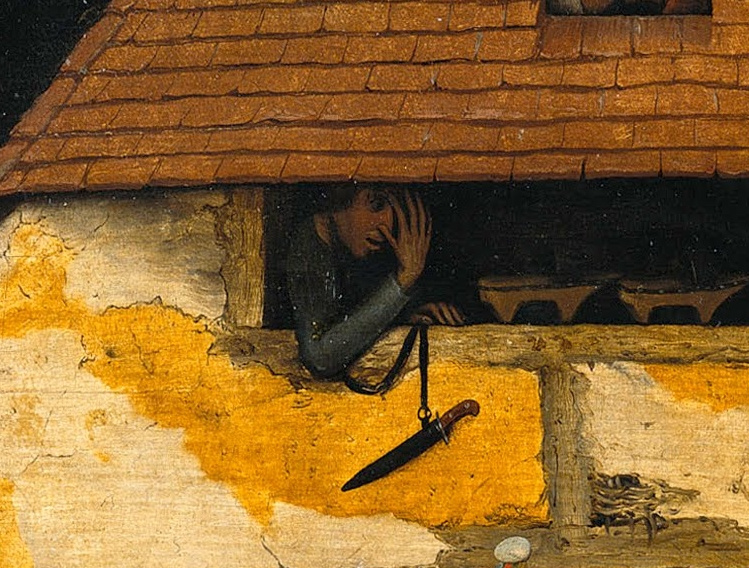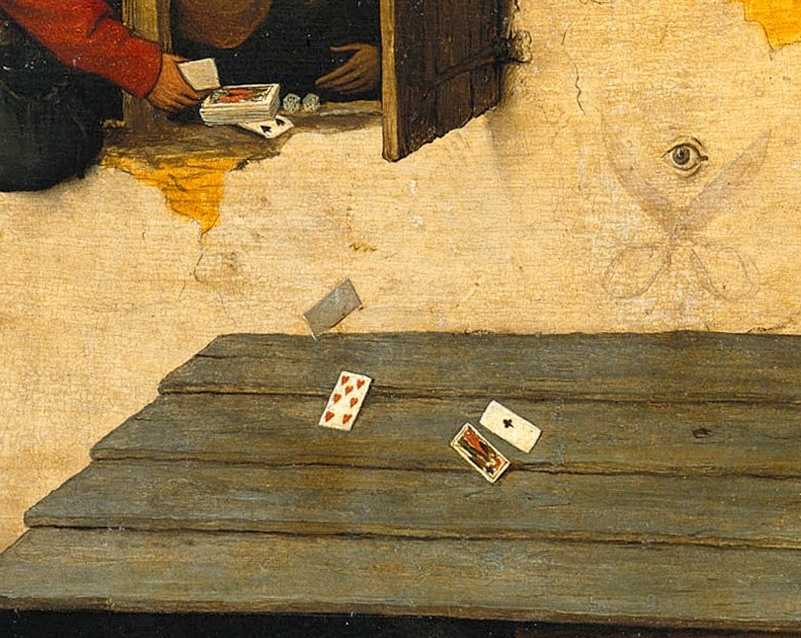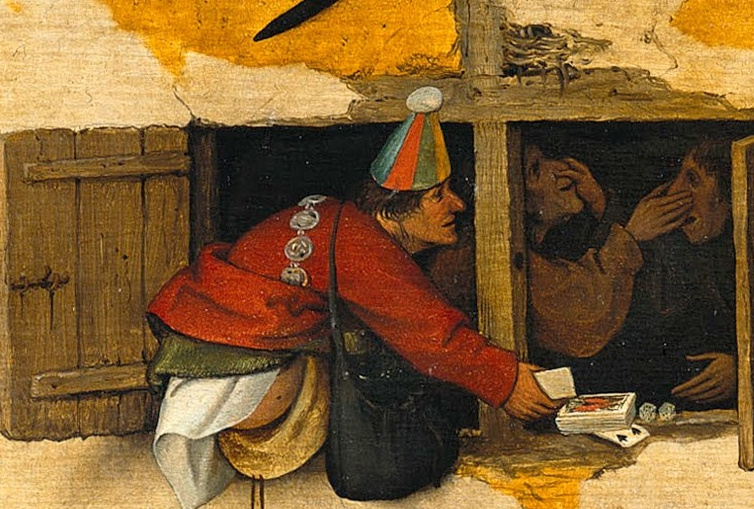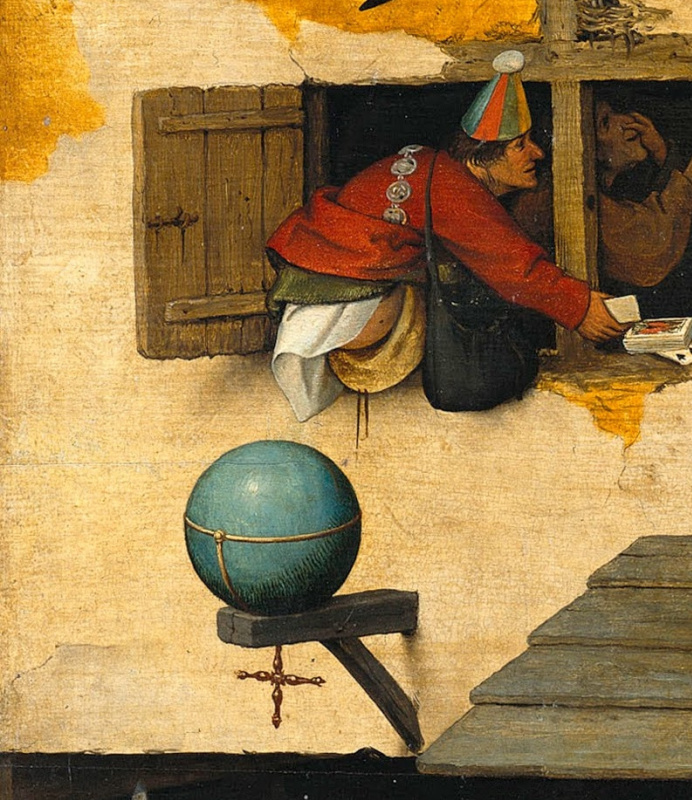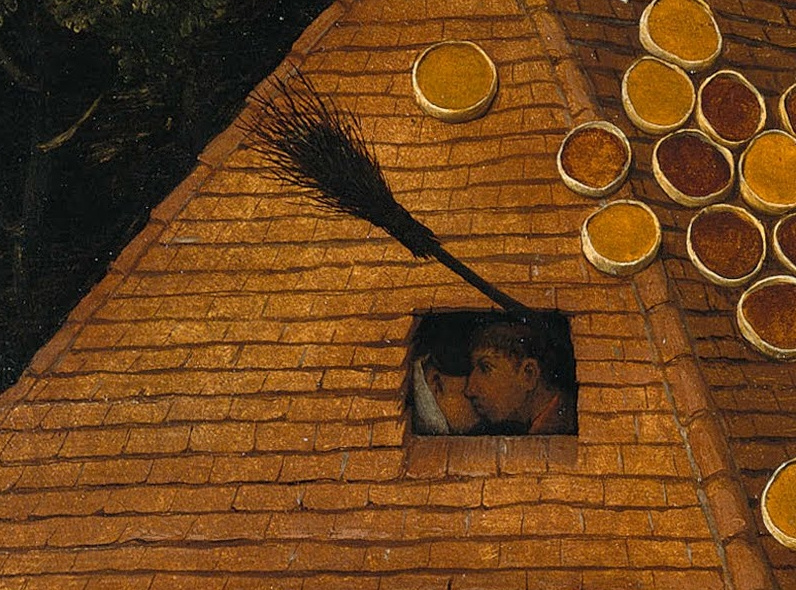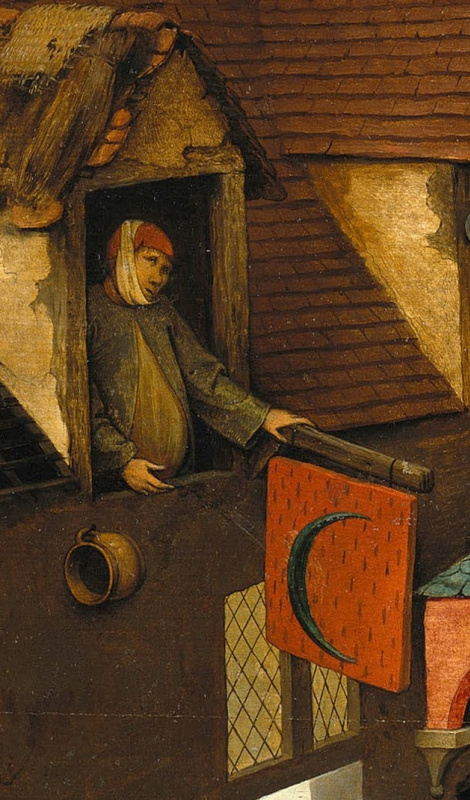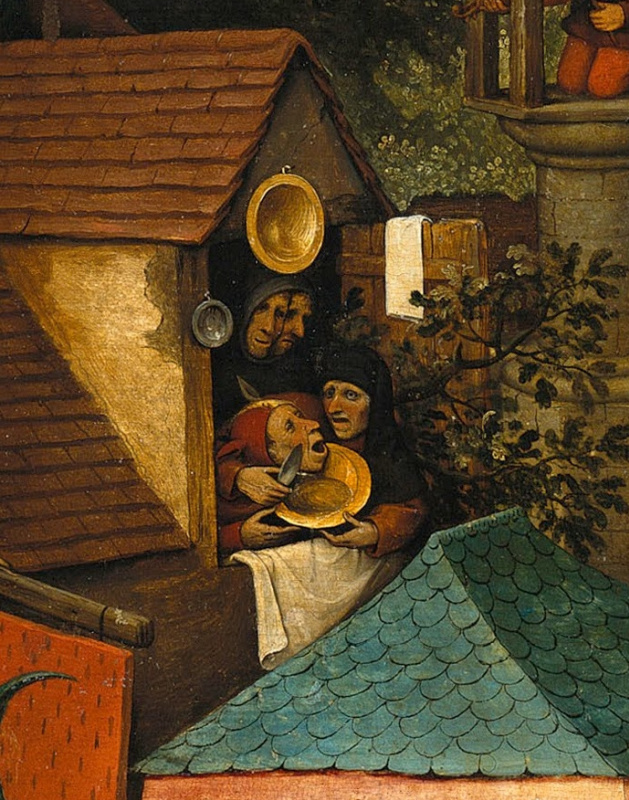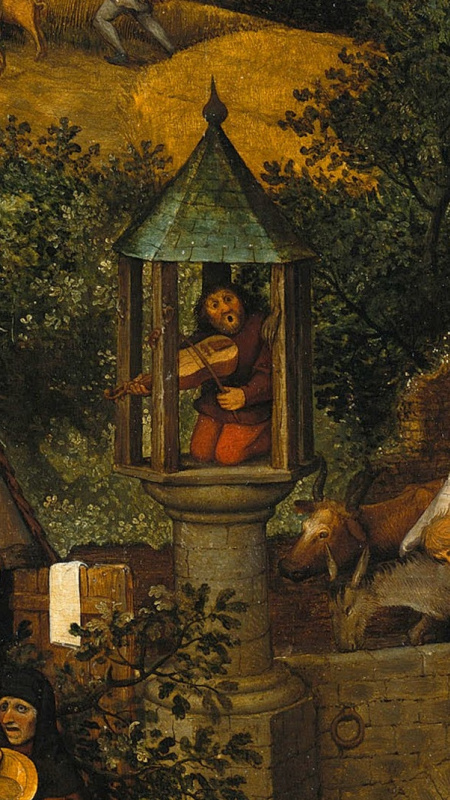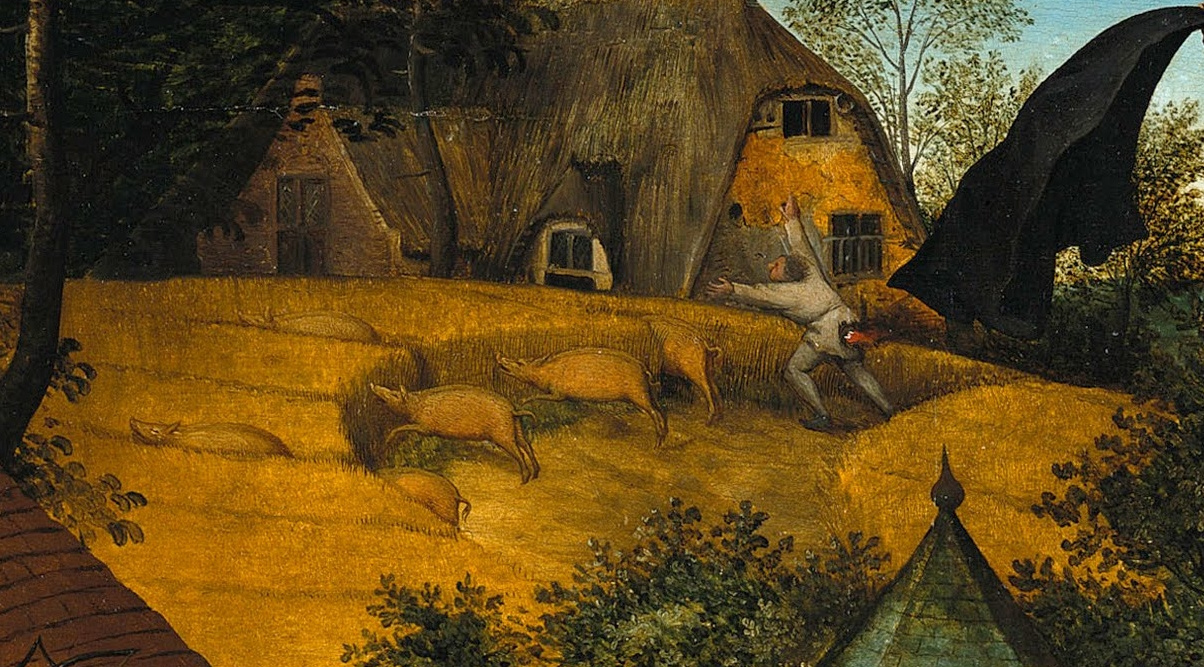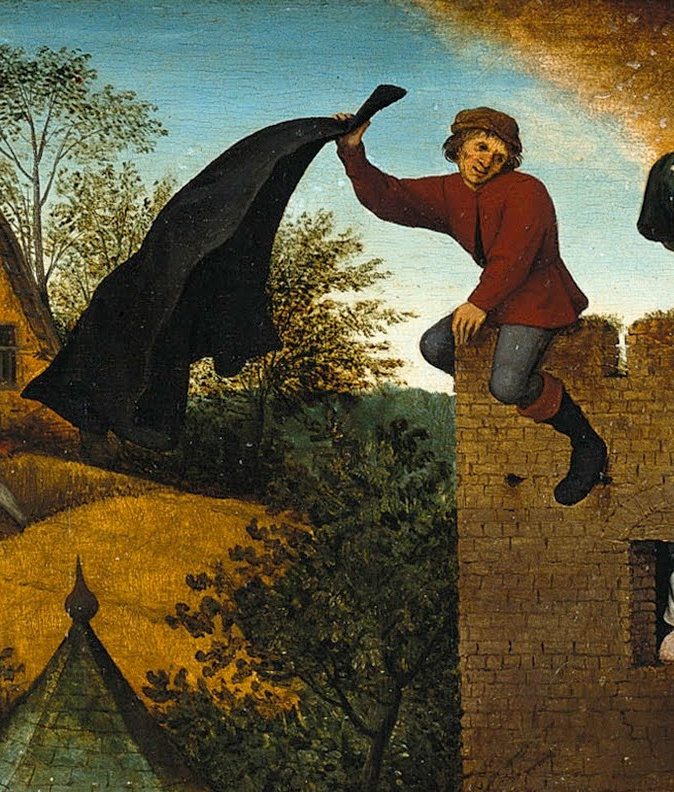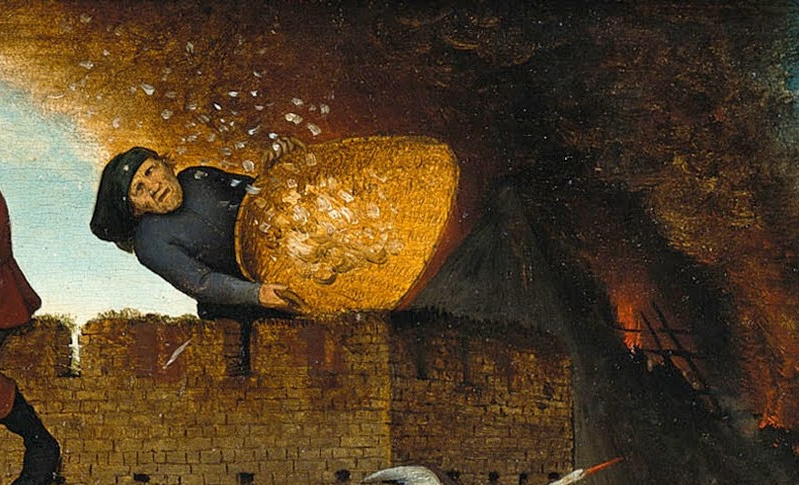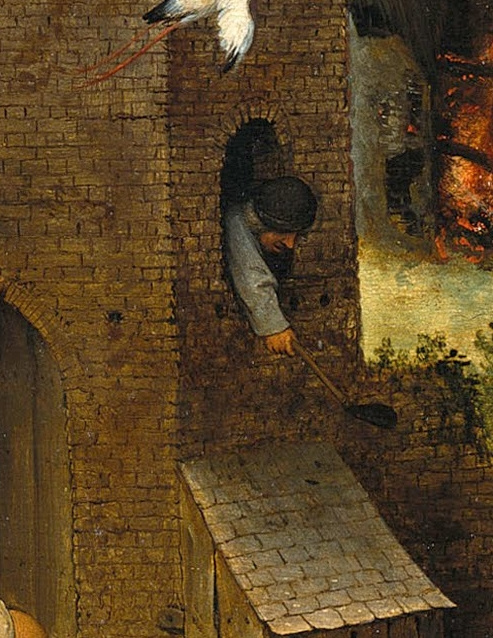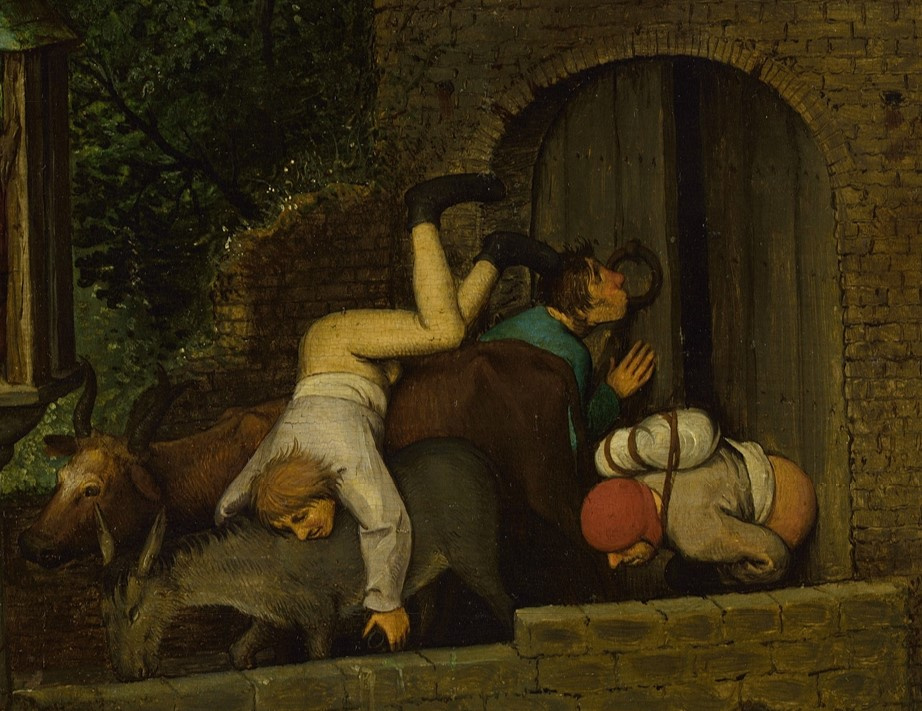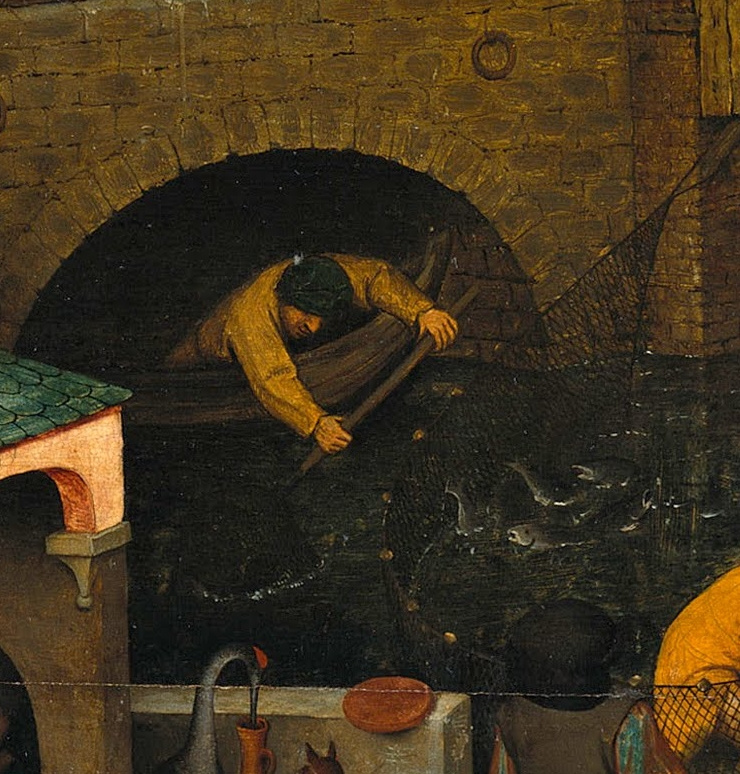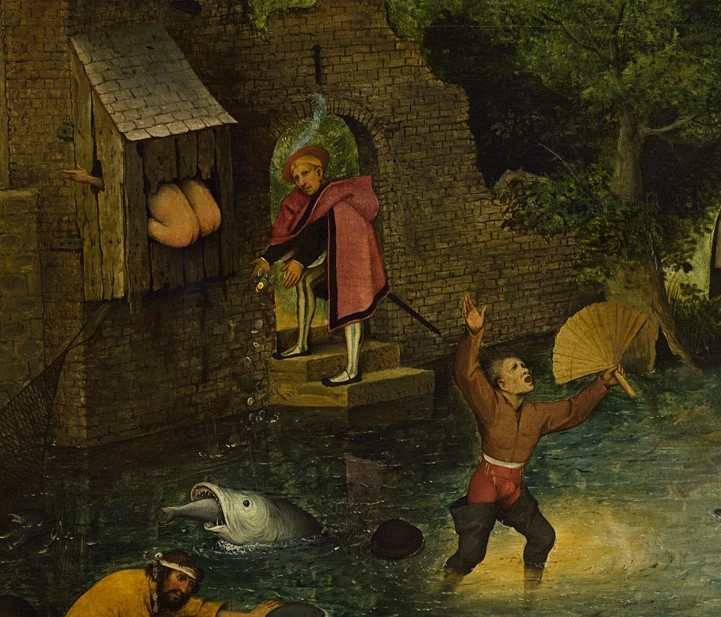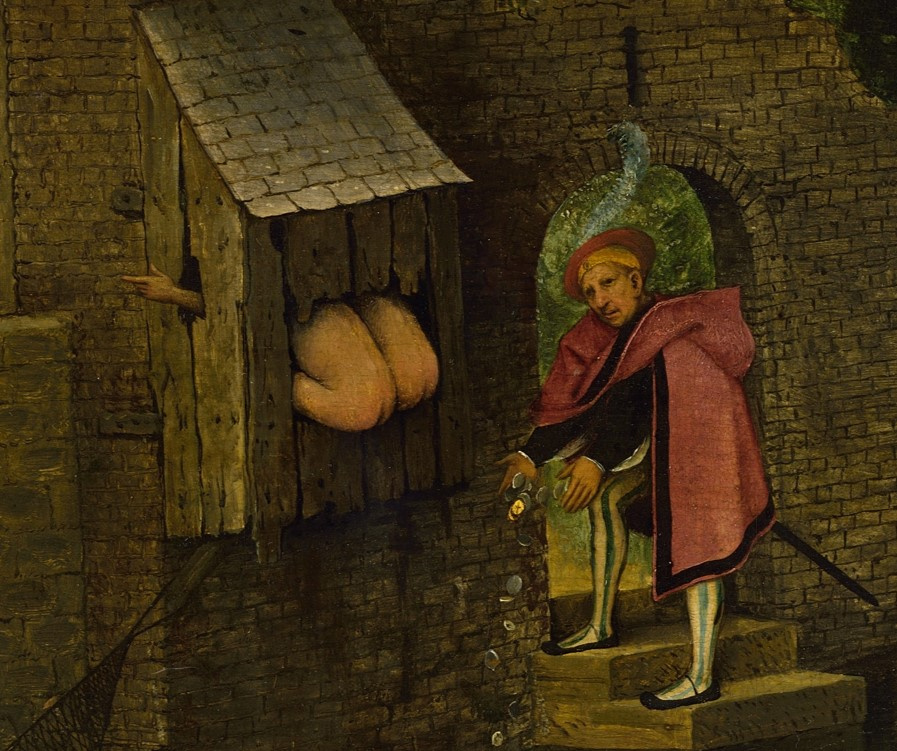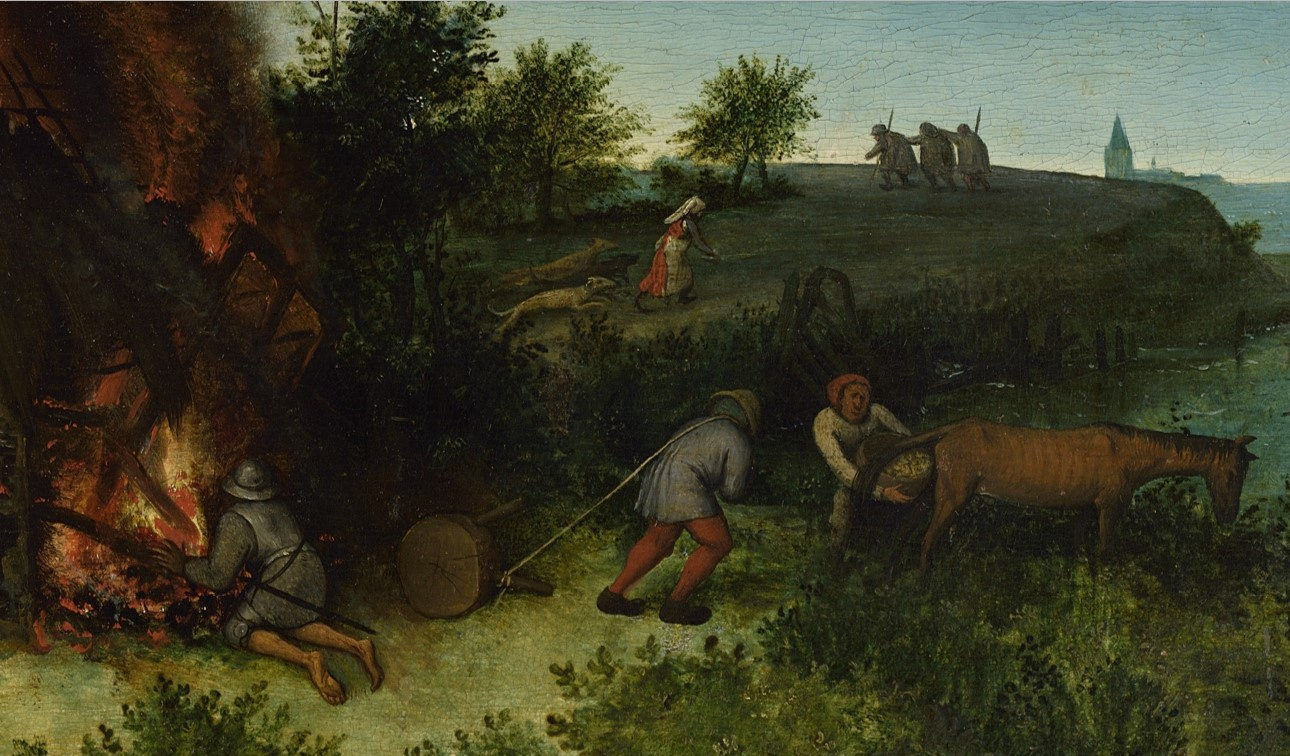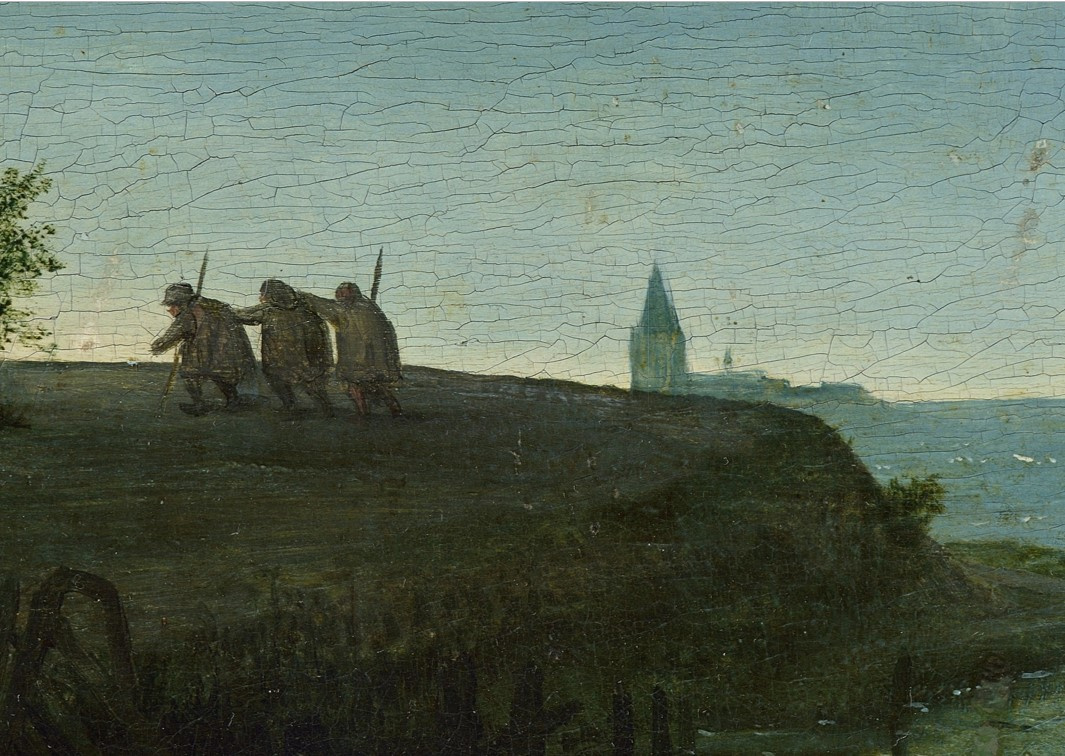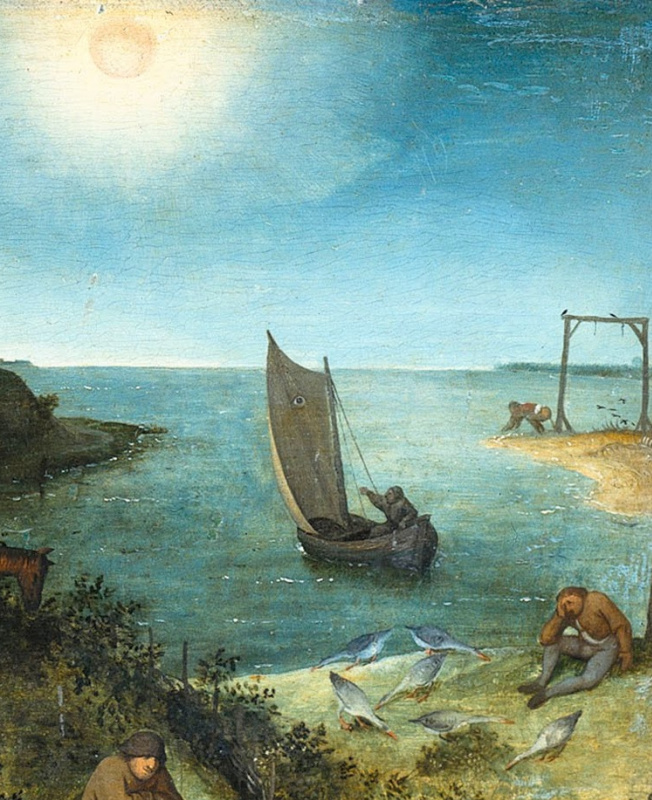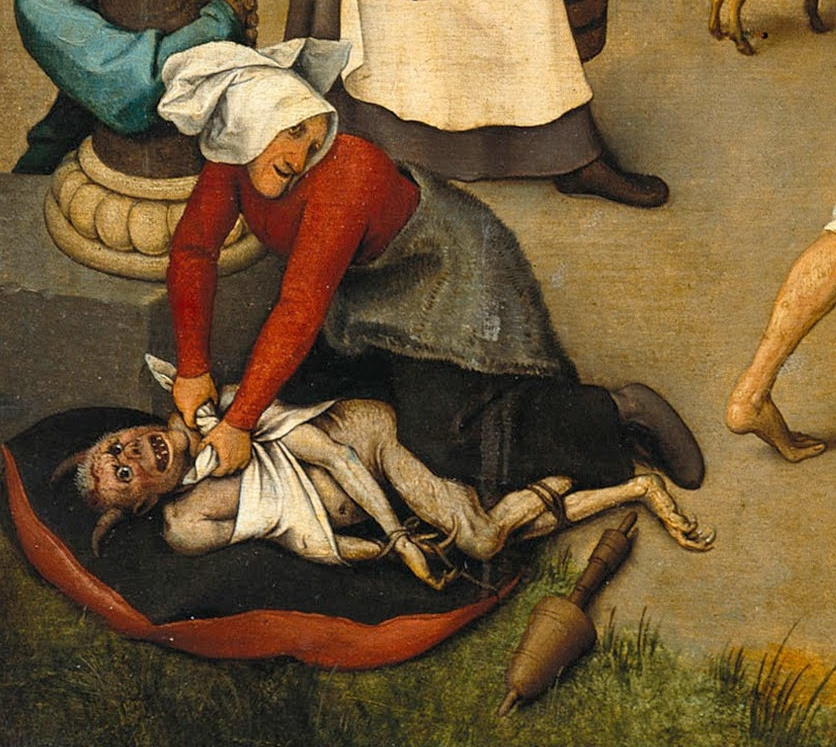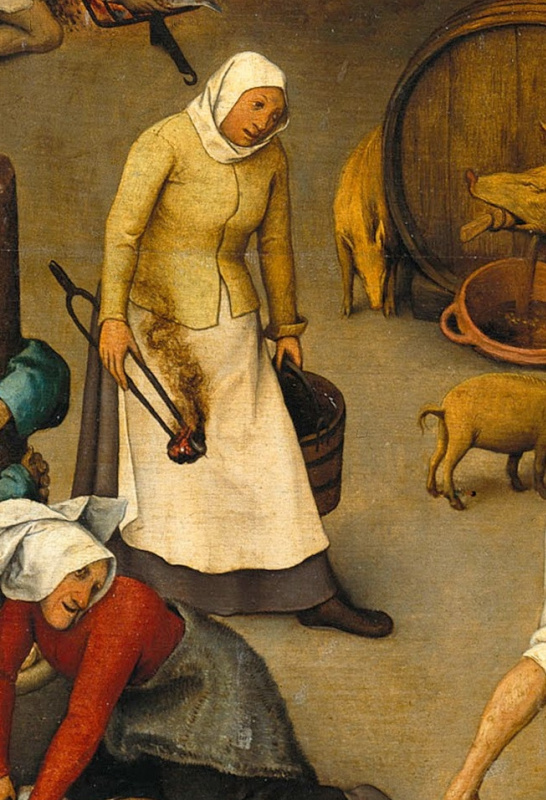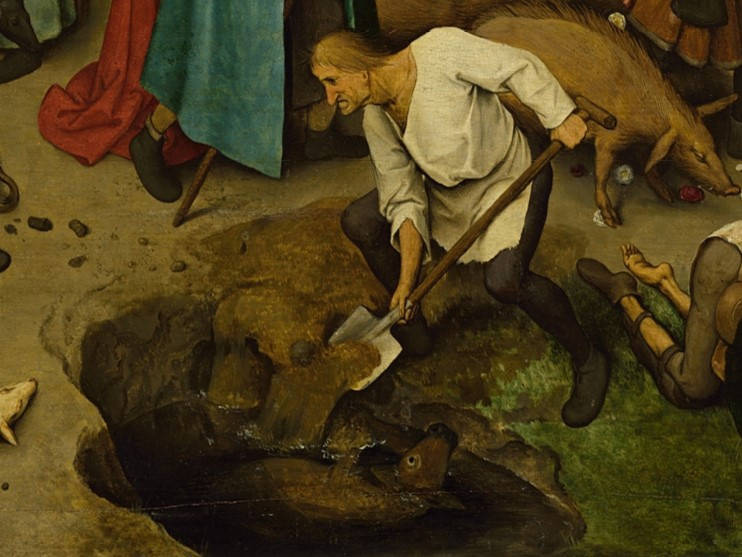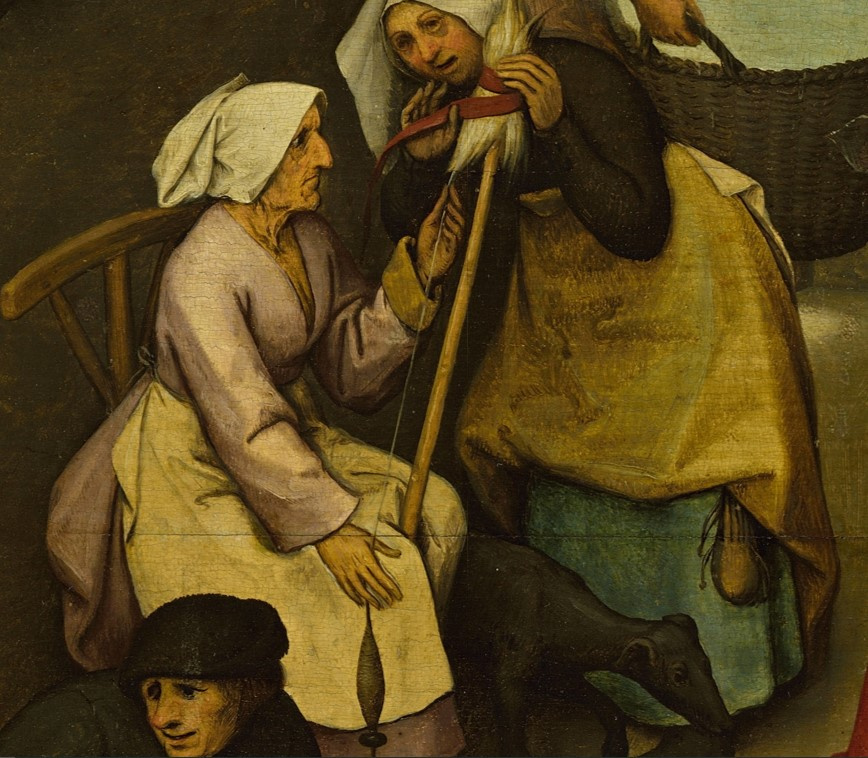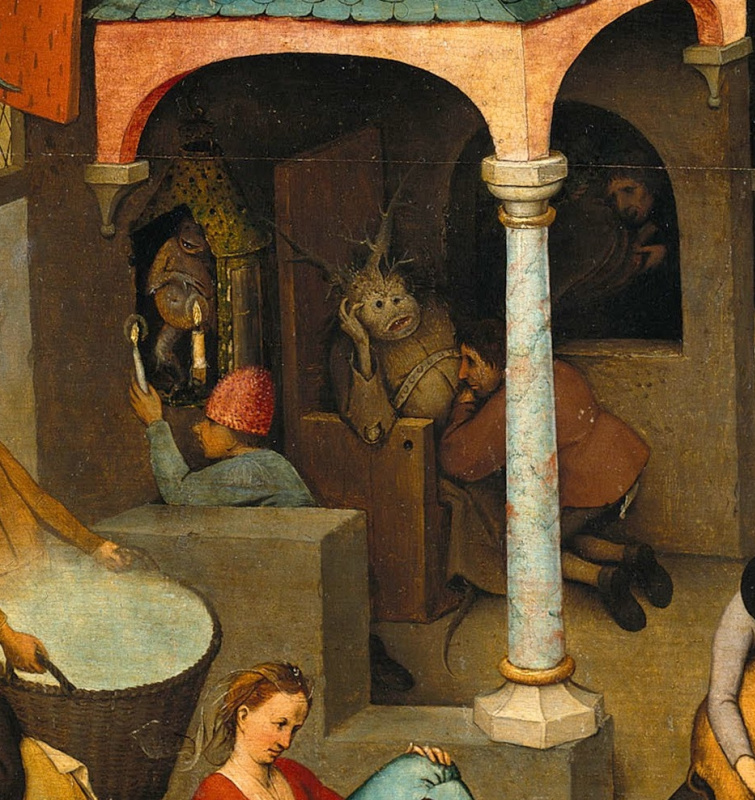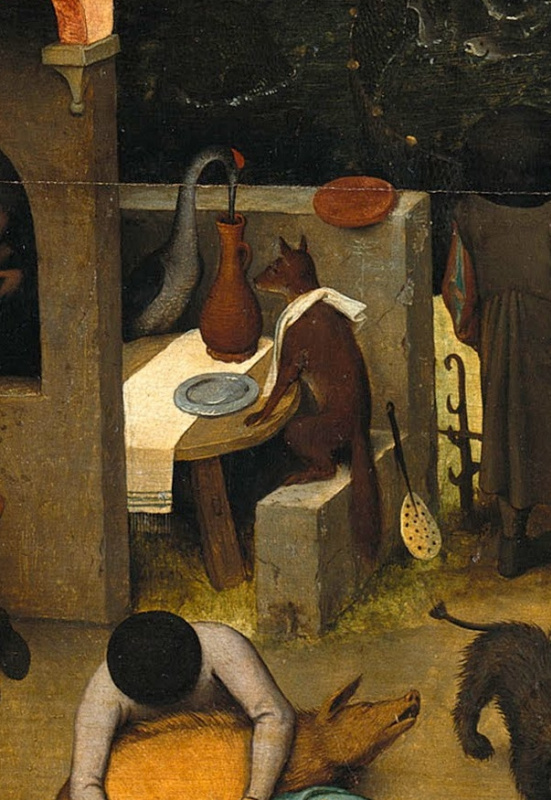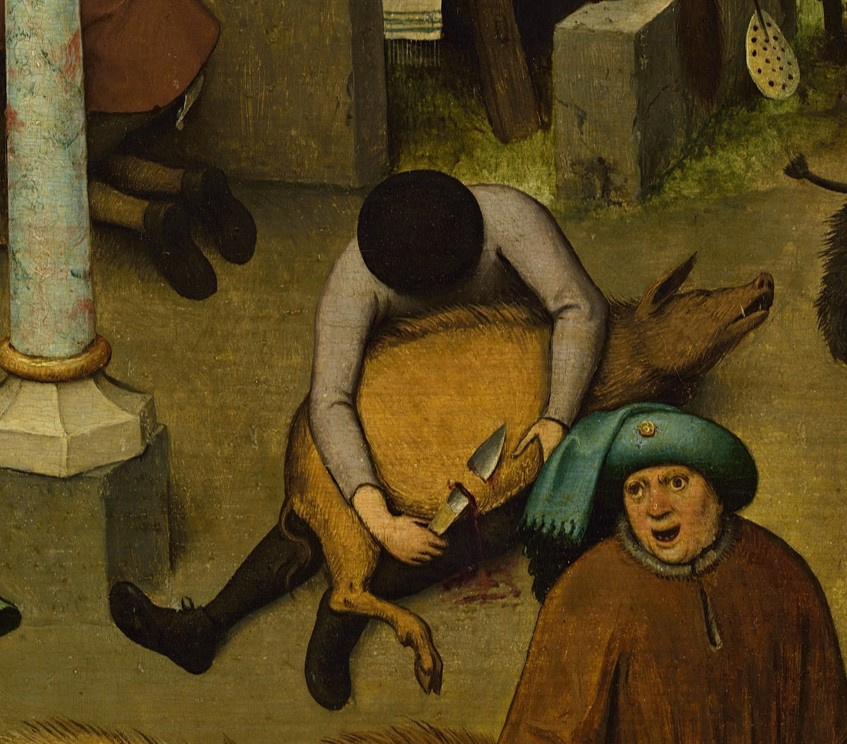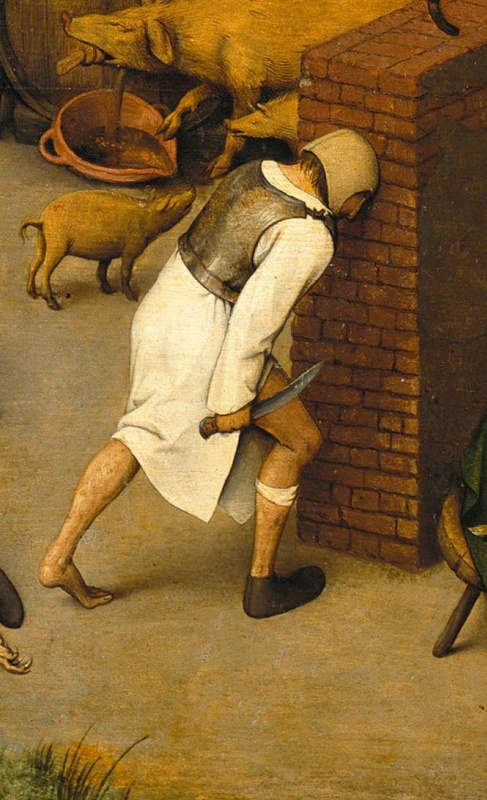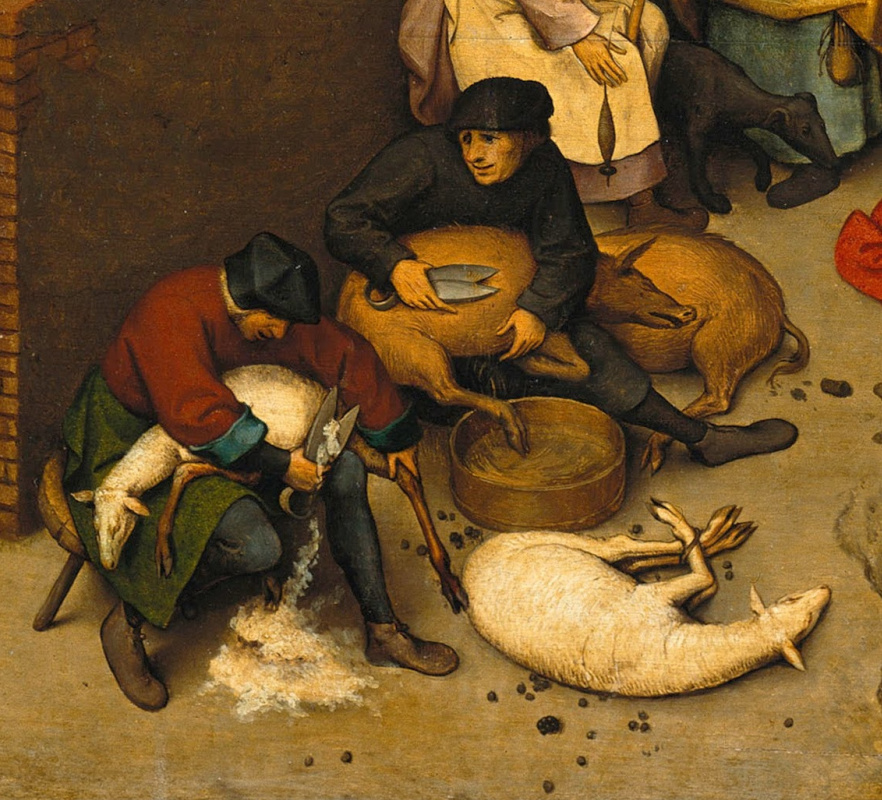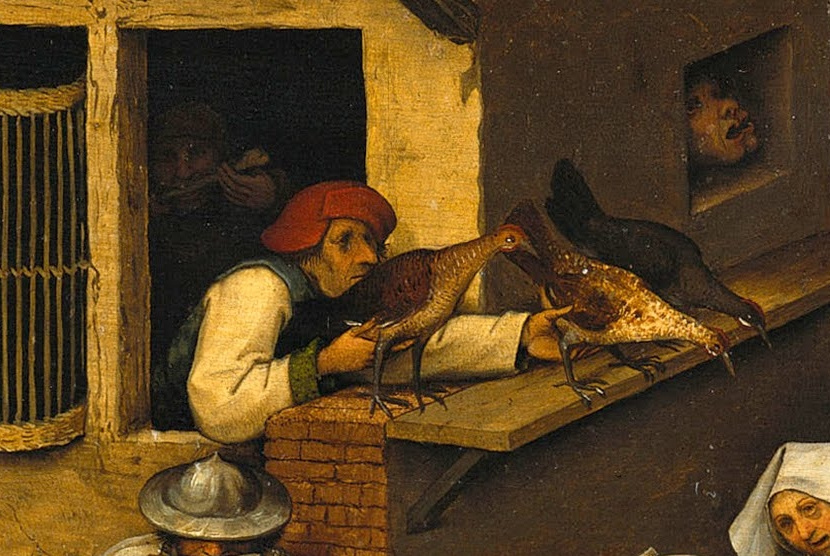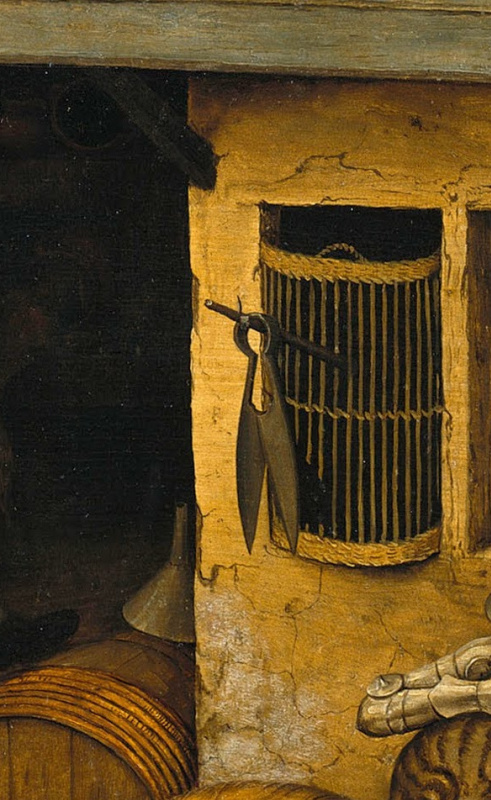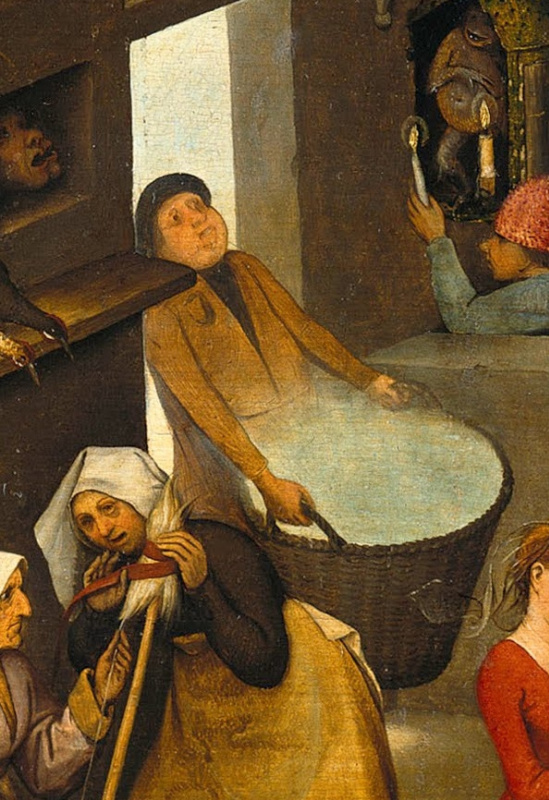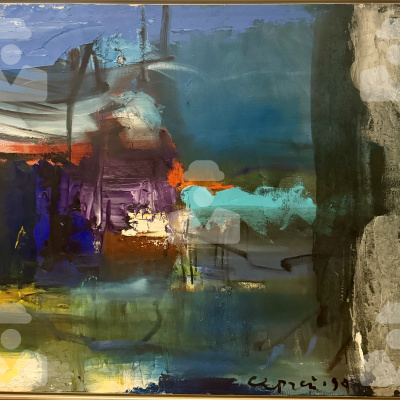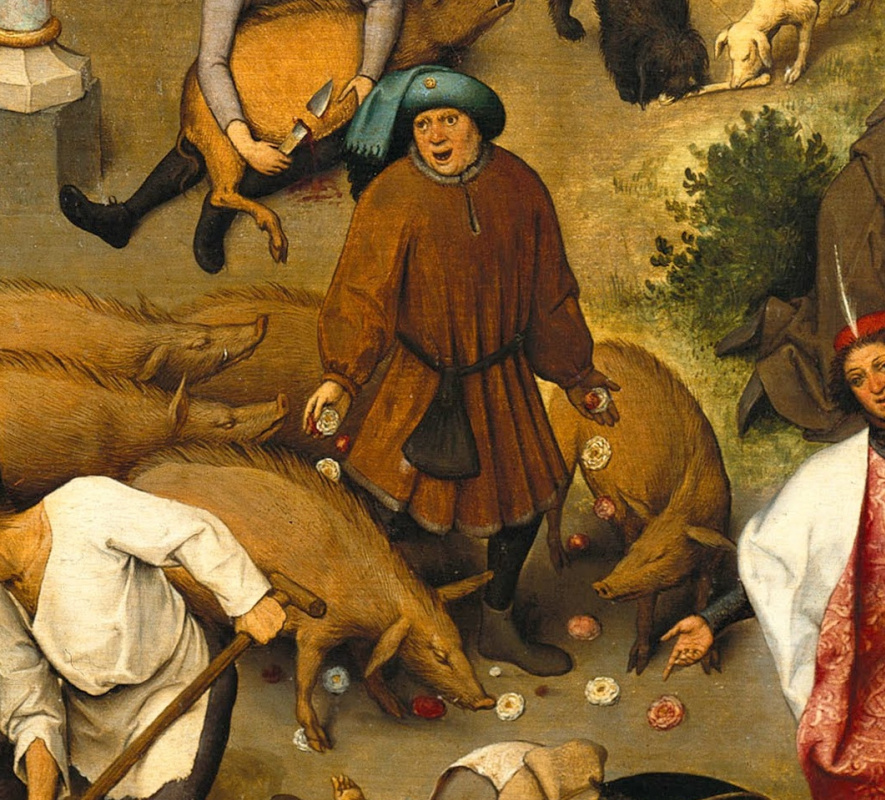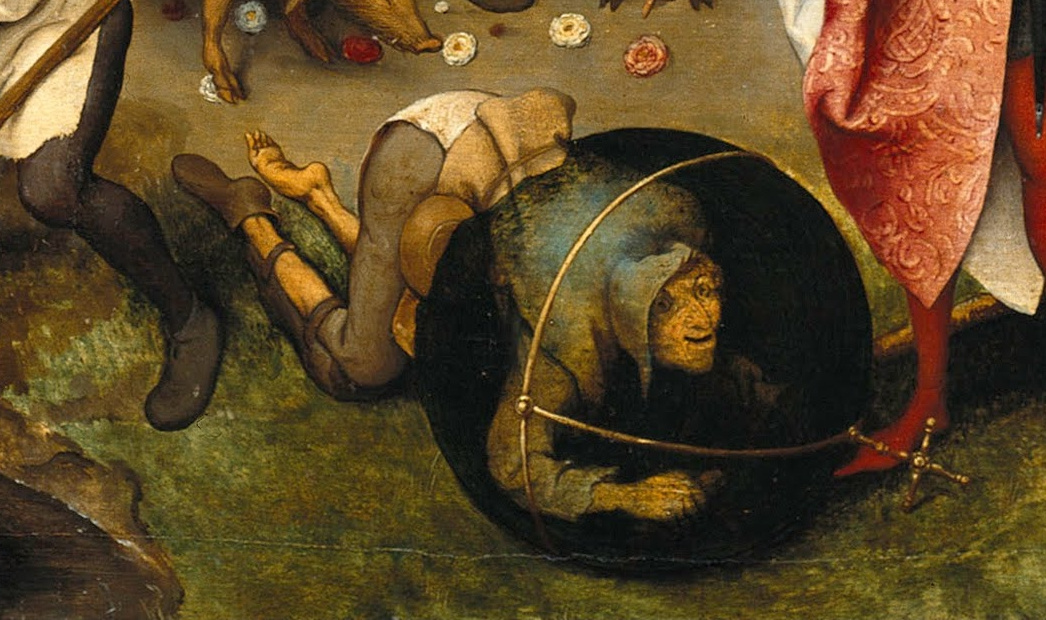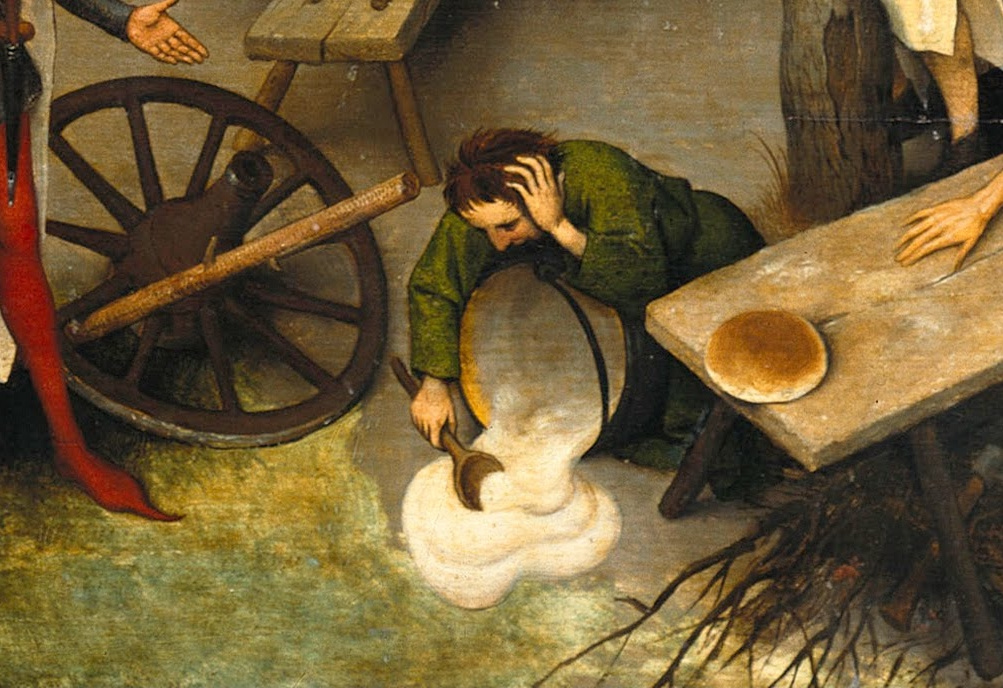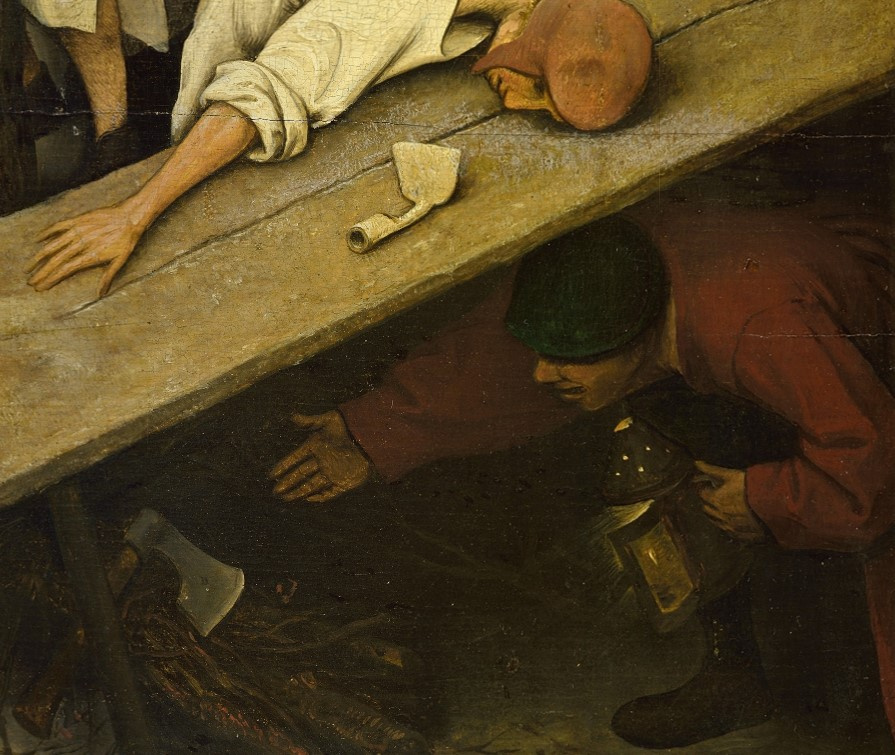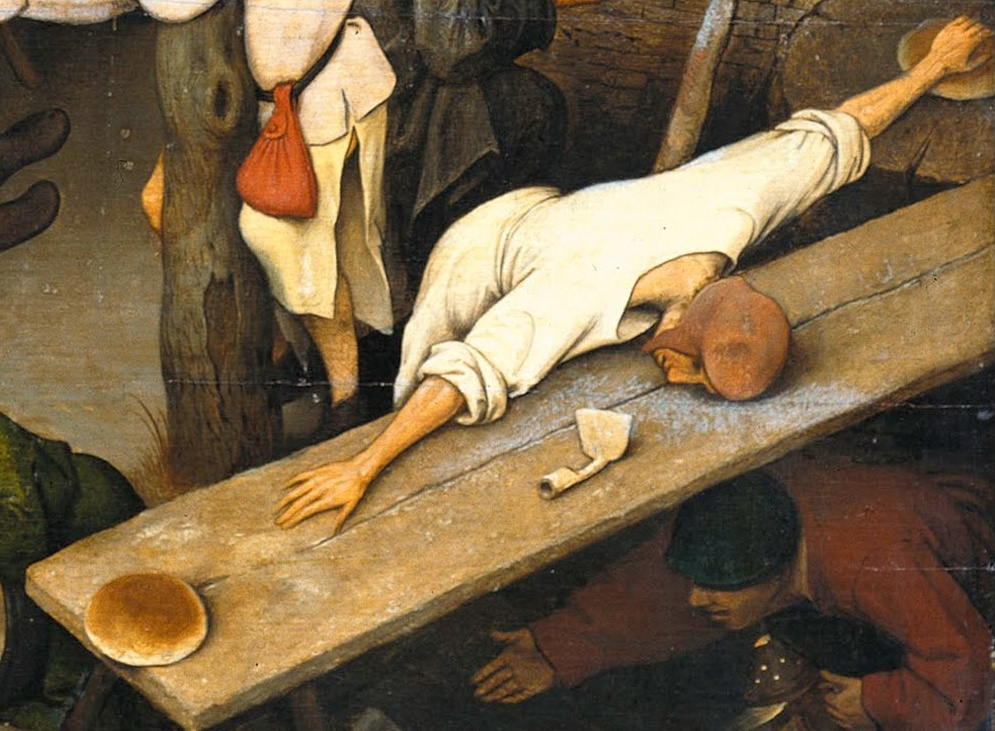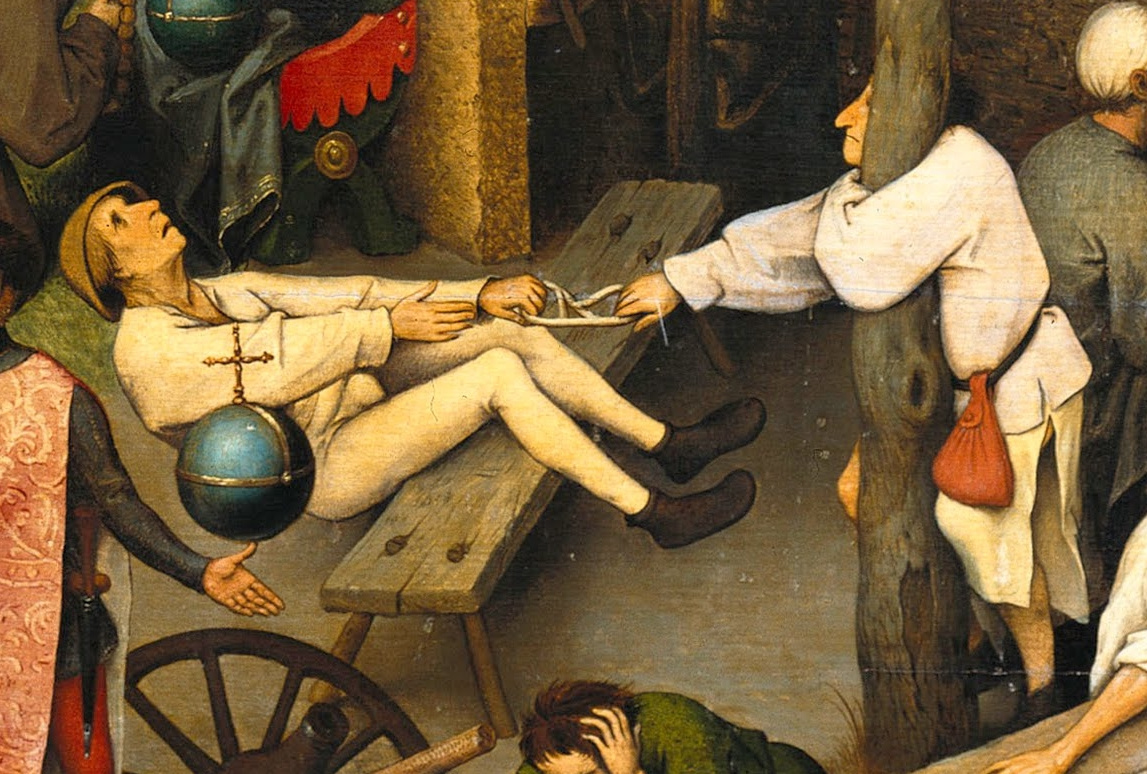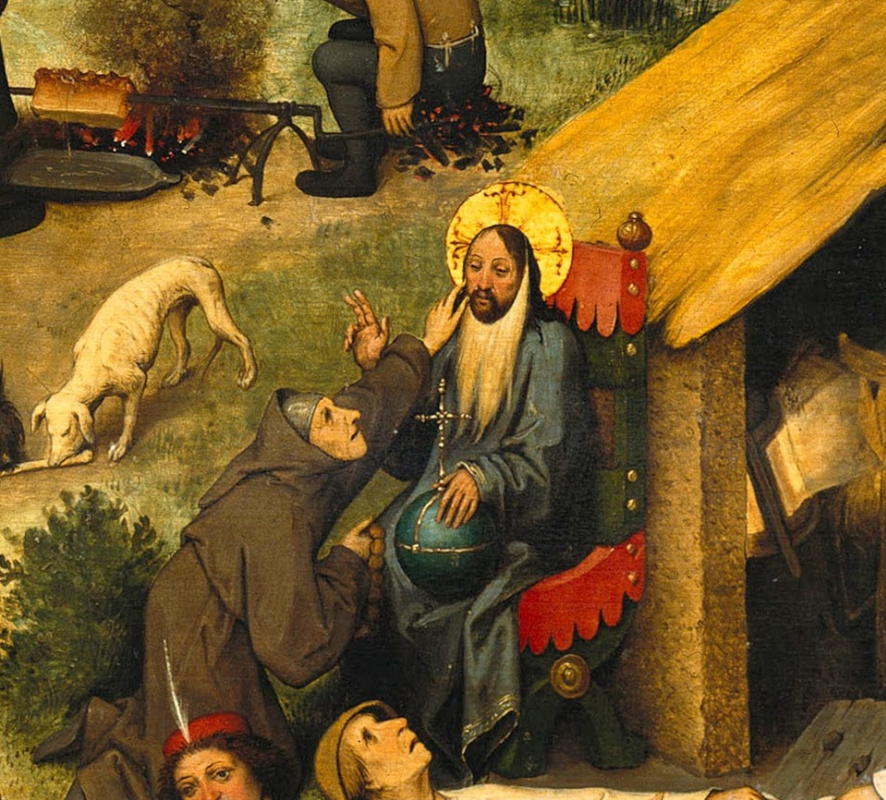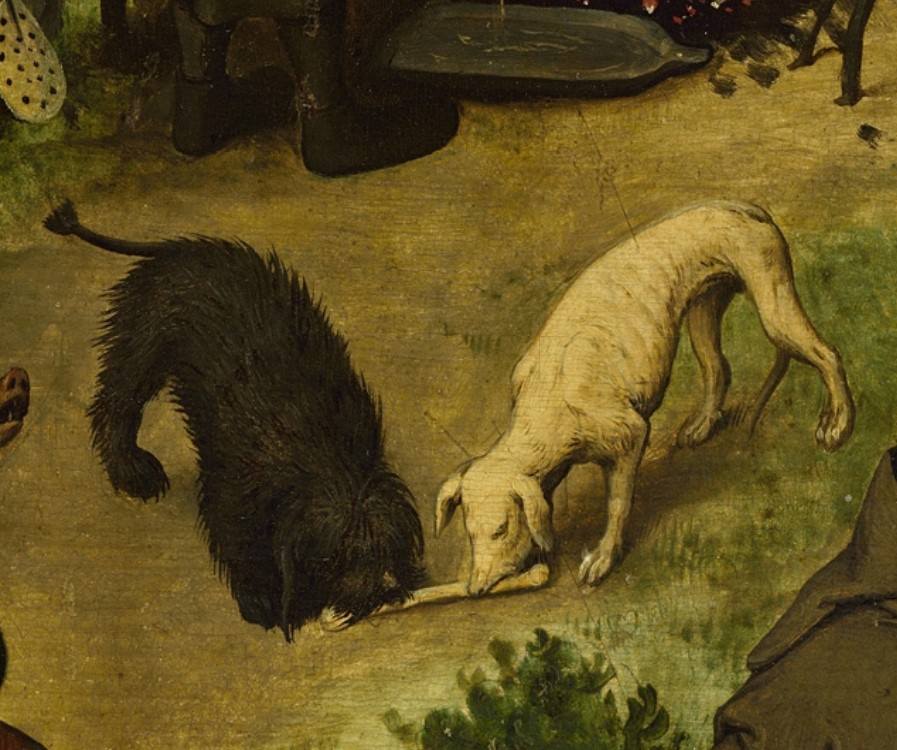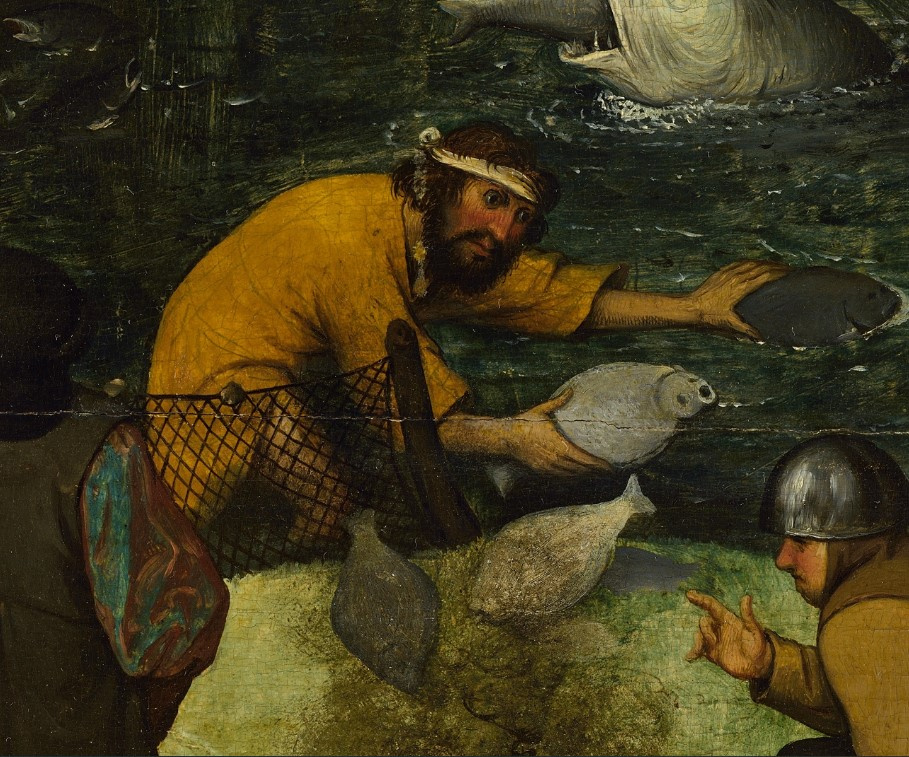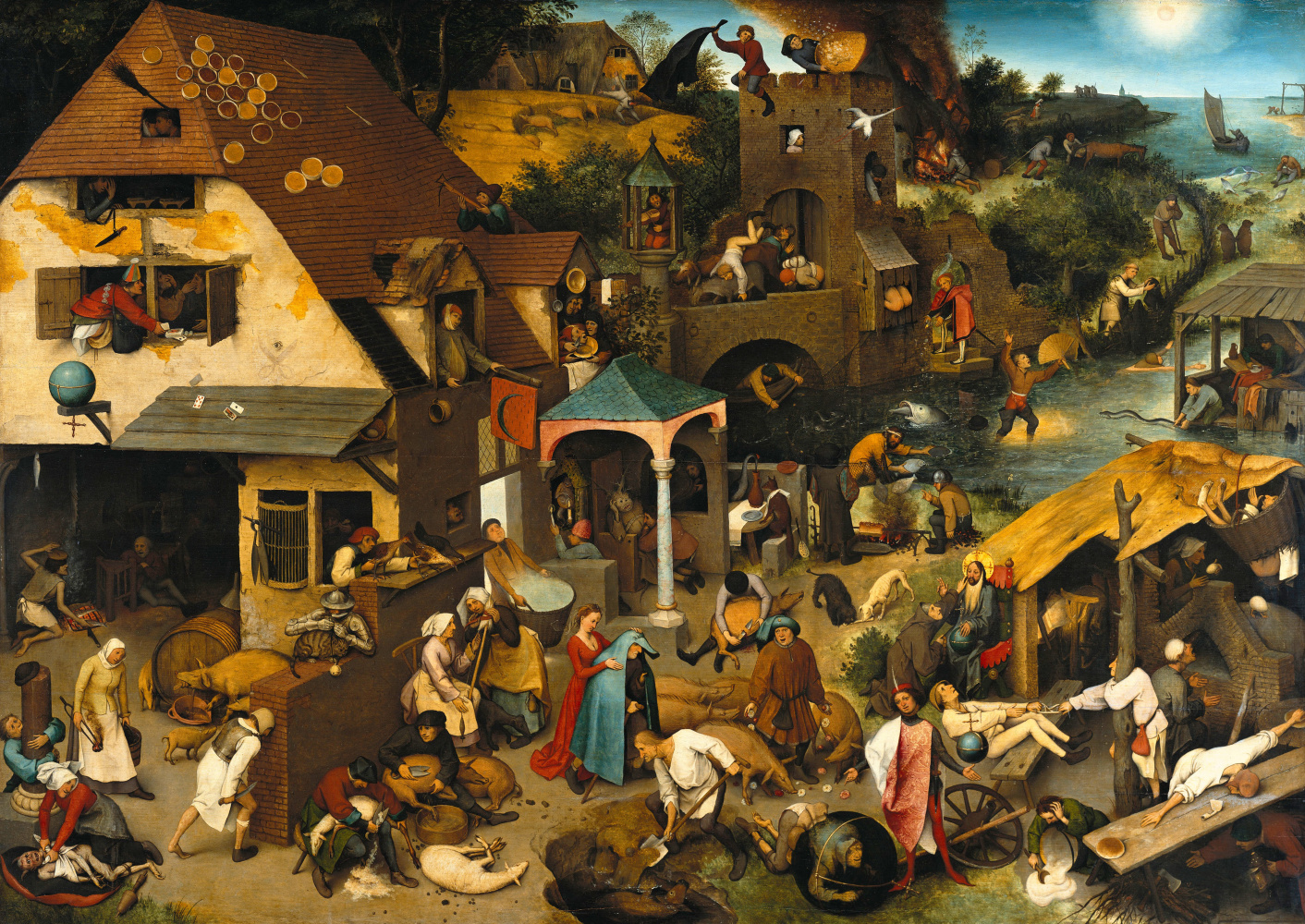
This relatively small (117 by 164 cm) painting by Peter Bruegel the Elder, painted in oil on wood, is a detailed masterpiece visualizing more than a hundred proverbs. The artist is known for the careful approach to his work. At first we consider it just a village scene with a wide range of subjects, but soon it turns out to be something more significant. It is an "encyclopedia of all human wisdom gathered under a clownish cap", which ridicules wittily the vanity and stupidity of many human actions.
Examining this panel, you will find a treasury in which some figures illustrate several phrases. For example, a man in armour and a knife in his teeth, clinging a bell to a cat, means at the same time "to be armed to the teeth", "to put your armour on" (to be angry) and, in fact, "to bell the cat" (to carry out a dangerous or impractical plan).
The creative potential and imagination of Brueghel are unbelievable — he managed to put so much sense in one work! We will look at some particularly interesting Flemish proverbs, giving them the English equivalent or explanation. Of course, in order to enjoy the original, you have to go to the Berlin art gallery. However, Google Arts & Culture has an excellent high-resolution image that allows you to study all the fragments in detail.
Upper left quarter
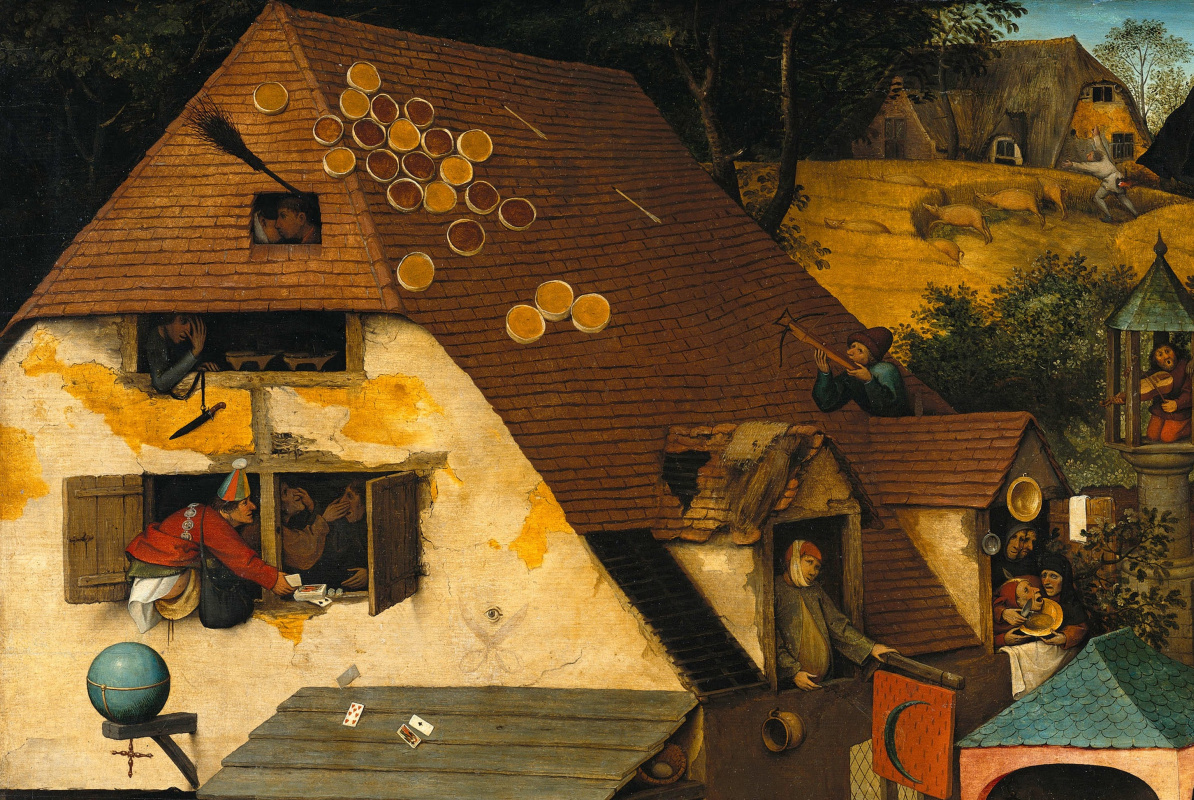
However, some phrases need clarification. For example, the broom sticking out of the window ("to stick out the broom") means "to have fun while the master is away", and the kissing couple under it ("to marry under the broomstick") means living together without marrying. The expression "to have the roof tiled with tarts" implies one’s wealth; "a hole in one’s roof" means being unintelligent. "The roof has laths" is the equivalent of our "the walls have ears" - there could be eavesdroppers; "An old roof needs a lot of patching up" - old things need more maintenance. The egg in the basket under the canopy refers to the necessity to leave something in reserve ("leave at least one egg in the nest"). Wooden shoes next to a man looking through his fingers indicate a vain expectation ("there stand the wooden shoes"), and the knife hanging on his hand indicates a difficult enterprise requiring skill ("there hangs the knife").
The scene with the peasant running across the field after pigs contains four catchphrases at once: "run as if the ass is on fire" (no explanation needed); "Who swallows fire, defecates with sparks" (do not be surprised at the result when you decide on a dangerous enterprise); "If the gates are open, the pigs run in the bread" (hindsight turns into a disaster); "Grain is smaller — the pig is thicker" (if it decreases for someone, then it increases for someone).
Upper right quarter

Five proverbs are encrypted on the site where three people and cattle collided. When someone has a black period in his life, they say that he "fell from the ox onto the rear end of an ass", and the man who exaggerates his troubles just "goes around shouldering a burden". "To wipe one’s backside on the door" means to treat someone or something lightly, "to kiss the ring of the door" means to be obsequious. And here "one beggar pities the other standing in front of the door" - the fear of competition.
A man "fishing behind the net" misses the opportunities, and "throwing money into the water" wastes them ("spends like water"). "Big Fish Eat Little Fish," and who is "unable to see the sun shine on the water" is jealous of other people’s successes. "They both crap through the same hole" - they are inseparable comrades; "anybody can see through an oak plank if there is a hole in it," says the obvious; "hangs like a privy over a ditch" is something taken for granted.
The very tiny images come next. "Fear makes the old woman trot" - an unexpected event can reveal unknown qualities; "if the blind lead the blind both will fall in the ditch" - there is no point in being guided by others who are equally ignorant. "The journey is not yet over when one can discern the church and steeple" - do not give up until the task is fully complete; "everything, however finely spun, finally comes to the sun" - nothing can be hidden forever.
The sailor in the boat at the same time "easily sails before the wind" (that is, takes advantage of favourable circumstances) and "keeps an eye on the sail" (is on the alert).
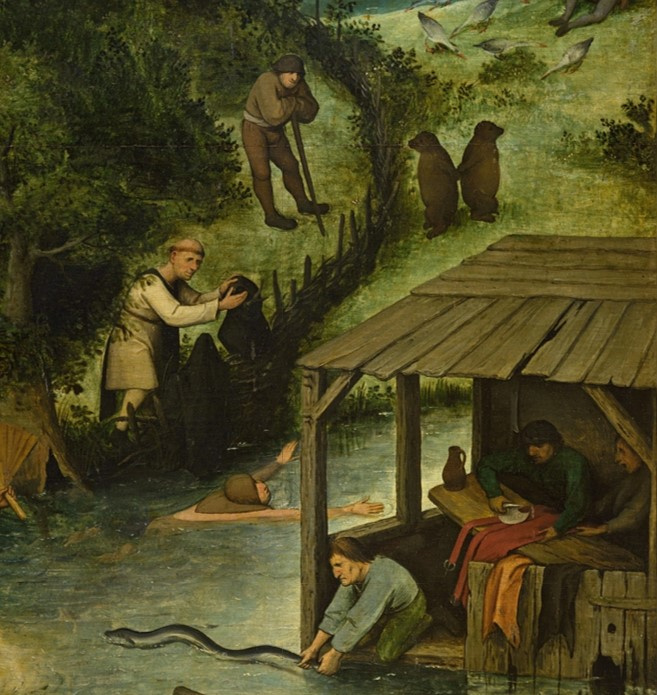
Almost on the horizon, a man craps on the gallows, showing that he is not afraid of any consequences of his actions. Crows fly over the corpse, demonstrating that everyone seeks to get his own benefit, if any. Below, a man looks at geese, wondering: "if I am not meant to be their keeper, I will let geese be geese" (do not interfere in matters that are not your concern, "mind your own beeswax"). And the birds themselves recall the proverb "Who knows why geese go barefoot?" - there is a reason for everything, though it may not be obvious.
Two bears are identified with the phrase "wild bears prefer each other’s company" (that is, peers get along better with each other than with outsiders), and the meaning of the man looking at their dance ("to see bears dancing") is actually lost. Perhaps this phrase means "to starve". The farmer throwing a cowl over the fence is discarding something without knowing whether it will be required later.
Lower left quarter

Behind their backs the young man "fry the whole herring for the sake of the roe", that is, he does too much to achieve a little; and if something doesn’t go according to plan for the Flemish, he will say "the herring does not fry here". The smoke from the brazier does not harm the saw hanging above it ("what can smoke do to iron?") — there is no point in trying to change the unchangeable; "The herring hangs by its own gills" (you must accept responsibility for your own actions) and in general "there is more in it than an empty herring" (more to it than meets the eye).
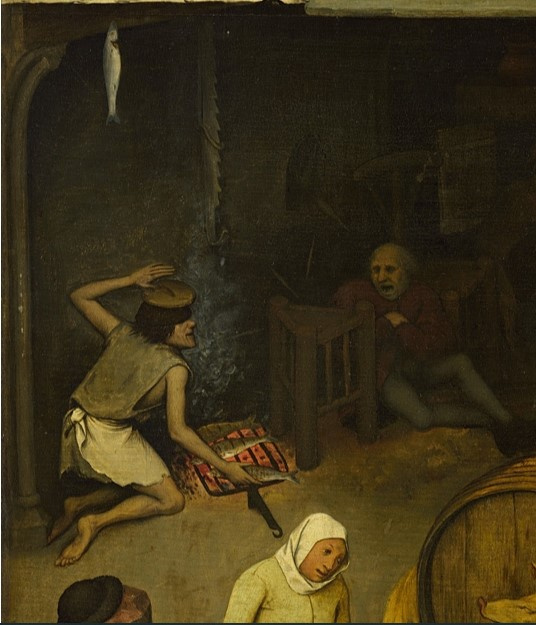
A young man with a fish "got the lid on the head", that is, he ended up taking responsibility, and his interlocutor "sits between two stools in the ashes" - demonstrates uncertainty. If you look even deeper into this dark fragment of the picture, you can "find a dog in the pot" - that is to arrive too late for dinner and find all the food has been eaten.
However, here you are still to be deceived, as scissors hanging on a window braid are warning. Behind them, in the depth of the room, the character "always gnaws on a single bone", that is continually talks about the same subject. The man in the red cap, leaning out of the window, is a "hen feeler" that is, he feels very miserly.
We have already discussed the woman throwing a cloak on her husband above. Behind her, two busybodies are identified with the phrase "one winds on the distaff what the other spins" that is, both spread gossip. The black dog between them ("Watch out that a black dog does not come in between") hints that everything could go even worse. The man who "carries daylight in a basket" is wasting time; the man who "holds a candle to the devil" flatters and makes friends indiscriminately; and whoever "confesses to the devil" gives secrets to enemies.
Lower right quarter
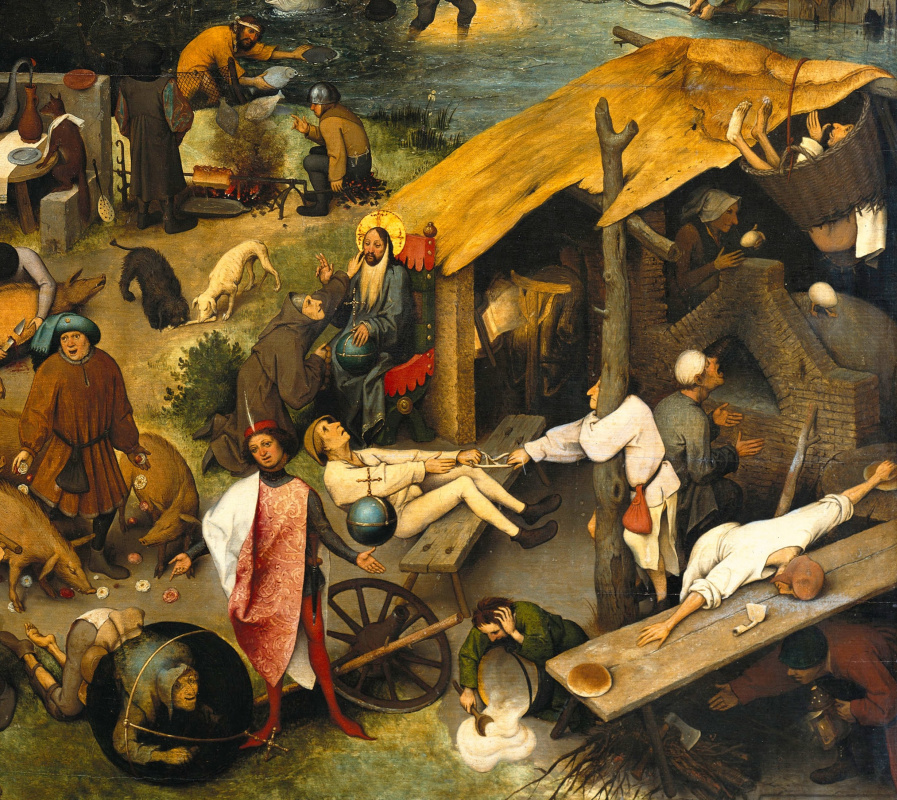
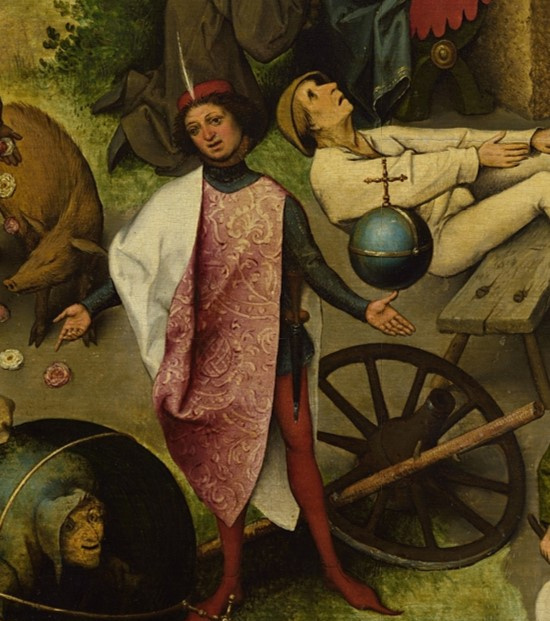
A person who "has spilt his porridge cannot scrape it all up again", that is, once something is done it cannot be undone. And the man spread between two loaves of bread lives from hand to mouth or struggles from paycheck to paycheck, as we would now say. A hoe without a handle, lying on the trestle, probably means something useless; the hatchet on the axe under the tabletop is something whole. However, the meaning of these two characters is not completely clear. The character who is "looking for an hatchet" is actually trying to come up with an excuse, and the lantern in his hand hints that he finally found use for his talents ("here he is with his lantern").
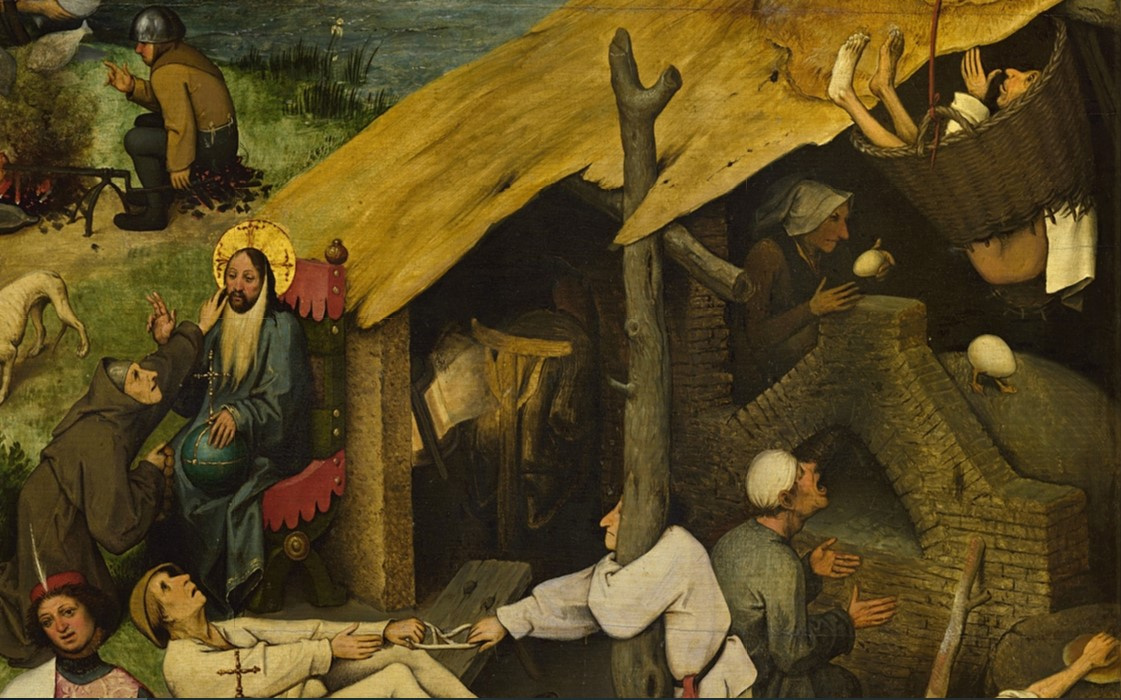
A man in an iron helmet "sits on hot coals" (we would say "sits on thorns", shows impatience), but "there is no turning the spit with him", that is, he is uncooperative. And also "the meat on the spit must be basted" - certain things need constant attention. The fisherman, who "catches fish without a net," uses the fruits of other people’s labour.
It remains to add that the work was so popular with customers that the artist’s son Peter Brueghel the Younger made about two dozen copies, which mostly do not exactly match with the original.






